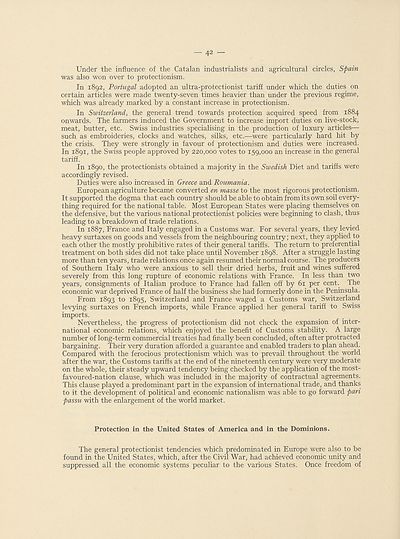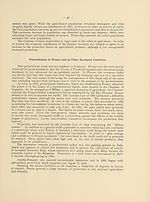Economic and financial section > Considerations on the present evolution of agricultural protectionism
(44)
Download files
Complete book:
Individual page:
Thumbnail gallery: Grid view | List view

— 42 —
Under the influence of the Catalan industrialists and agricultural circles, Spain
was also won over to protectionism.
In 1892, Portugal adopted an ultra-protectionist tariff under which the duties on
certain articles were made twenty-seven times heavier than under the previous regime,
which was already marked by a constant increase in protectionism.
In Switzerland, the general trend towards protection acquired speed from 1884
onwards. The farmers induced the Government to increase import duties on live-stock,
meat, butter, etc. Swiss industries specialising in the production of luxury articles—
such as embroideries, clocks and watches, silks, etc.—were particularly hard hit by
the crisis. They were strongly in favour of protectionism and duties were increased.
In 1891, the Swiss people approved by 220,000 votes to 159,000 an increase in the general
tariff.
In 1890, the protectionists obtained a majority in the Swedish Diet and tariffs were
accordingly revised.
Duties were also increased in Greece and Roumania.
European agriculture became converted en masse to the most rigorous protectionism.
It supported the dogma that each country should be able to obtain from its own soil every¬
thing required for the national table. Most European States were placing themselves on
the defensive, but the various national protectionist policies were beginning to clash, thus
leading to a breakdown of trade relations.
In 1887, France and Italy engaged in a Customs war. For several years, they levied
heavy surtaxes on goods and vessels from the neighbouring country; next, they applied to
each other the mostly prohibitive rates of their general tariffs. The return to preferential
treatment on both sides did not take place until November 1898. After a struggle lasting
more than ten years, trade relations once again resumed their normal course. The producers
of Southern Italy who were anxious to sell their dried herbs, fruit and wines suffered
severely from this long rupture of economic relations with France. In less than two
years, consignments of Italian produce to France had fallen off by 61 per cent. The
economic war deprived France of half the business she had formerly done in the Peninsula.
From 1893 to 1895, Switzerland and France waged a Customs war, Switzerland
levying surtaxes on French imports, while France applied her general tariff to Swiss
imports.
Nevertheless, the progress of protectionism did not check the expansion of inter¬
national economic relations, which enjoyed the benefit of Customs stability. A large
number of long-term commercial treaties had finally been concluded, often after protracted
bargaining. Their very duration afforded a guarantee and enabled traders to plan ahead.
Compared with the ferocious protectionism which was to prevail throughout the world
after the war, the Customs tariffs at the end of the nineteenth century were very moderate
on the whole, their steady upward tendency being checked by the application of the most¬
favoured-nation clause, which was included in the majority of contractual agreements.
This clause played a predominant part in the expansion of international trade, and thanks
to it the development of political and economic nationalism was able to go forward pari
passu with the enlargement of the world market.
Protection in the United States of America and in the Dominions.
The general protectionist tendencies which predominated in Europe were also to be
found in the United States, which, after the Civil War, had achieved economic unity and
suppressed all the economic systems peculiar to the various States. Once freedom of
Under the influence of the Catalan industrialists and agricultural circles, Spain
was also won over to protectionism.
In 1892, Portugal adopted an ultra-protectionist tariff under which the duties on
certain articles were made twenty-seven times heavier than under the previous regime,
which was already marked by a constant increase in protectionism.
In Switzerland, the general trend towards protection acquired speed from 1884
onwards. The farmers induced the Government to increase import duties on live-stock,
meat, butter, etc. Swiss industries specialising in the production of luxury articles—
such as embroideries, clocks and watches, silks, etc.—were particularly hard hit by
the crisis. They were strongly in favour of protectionism and duties were increased.
In 1891, the Swiss people approved by 220,000 votes to 159,000 an increase in the general
tariff.
In 1890, the protectionists obtained a majority in the Swedish Diet and tariffs were
accordingly revised.
Duties were also increased in Greece and Roumania.
European agriculture became converted en masse to the most rigorous protectionism.
It supported the dogma that each country should be able to obtain from its own soil every¬
thing required for the national table. Most European States were placing themselves on
the defensive, but the various national protectionist policies were beginning to clash, thus
leading to a breakdown of trade relations.
In 1887, France and Italy engaged in a Customs war. For several years, they levied
heavy surtaxes on goods and vessels from the neighbouring country; next, they applied to
each other the mostly prohibitive rates of their general tariffs. The return to preferential
treatment on both sides did not take place until November 1898. After a struggle lasting
more than ten years, trade relations once again resumed their normal course. The producers
of Southern Italy who were anxious to sell their dried herbs, fruit and wines suffered
severely from this long rupture of economic relations with France. In less than two
years, consignments of Italian produce to France had fallen off by 61 per cent. The
economic war deprived France of half the business she had formerly done in the Peninsula.
From 1893 to 1895, Switzerland and France waged a Customs war, Switzerland
levying surtaxes on French imports, while France applied her general tariff to Swiss
imports.
Nevertheless, the progress of protectionism did not check the expansion of inter¬
national economic relations, which enjoyed the benefit of Customs stability. A large
number of long-term commercial treaties had finally been concluded, often after protracted
bargaining. Their very duration afforded a guarantee and enabled traders to plan ahead.
Compared with the ferocious protectionism which was to prevail throughout the world
after the war, the Customs tariffs at the end of the nineteenth century were very moderate
on the whole, their steady upward tendency being checked by the application of the most¬
favoured-nation clause, which was included in the majority of contractual agreements.
This clause played a predominant part in the expansion of international trade, and thanks
to it the development of political and economic nationalism was able to go forward pari
passu with the enlargement of the world market.
Protection in the United States of America and in the Dominions.
The general protectionist tendencies which predominated in Europe were also to be
found in the United States, which, after the Civil War, had achieved economic unity and
suppressed all the economic systems peculiar to the various States. Once freedom of
Set display mode to:
![]() Universal Viewer |
Universal Viewer | ![]() Mirador |
Large image | Transcription
Mirador |
Large image | Transcription
Images and transcriptions on this page, including medium image downloads, may be used under the Creative Commons Attribution 4.0 International Licence unless otherwise stated. ![]()
| League of Nations > Economic and financial section > Considerations on the present evolution of agricultural protectionism > (44) |
|---|
| Permanent URL | https://digital.nls.uk/190896072 |
|---|
| Shelfmark | LN.II |
|---|
| Description | Over 1,200 documents from the non-political organs of the League of Nations that dealt with health, disarmament, economic and financial matters for the duration of the League (1919-1945). Also online are statistical bulletins, essential facts, and an overview of the League by the first Secretary General, Sir Eric Drummond. These items are part of the Official Publications collection at the National Library of Scotland. |
|---|---|
| Additional NLS resources: |
|

